八年级英语下第6单元Unit 6 Sunshine for all单词翻译及知识点
文档属性
| 名称 | 八年级英语下第6单元Unit 6 Sunshine for all单词翻译及知识点 | 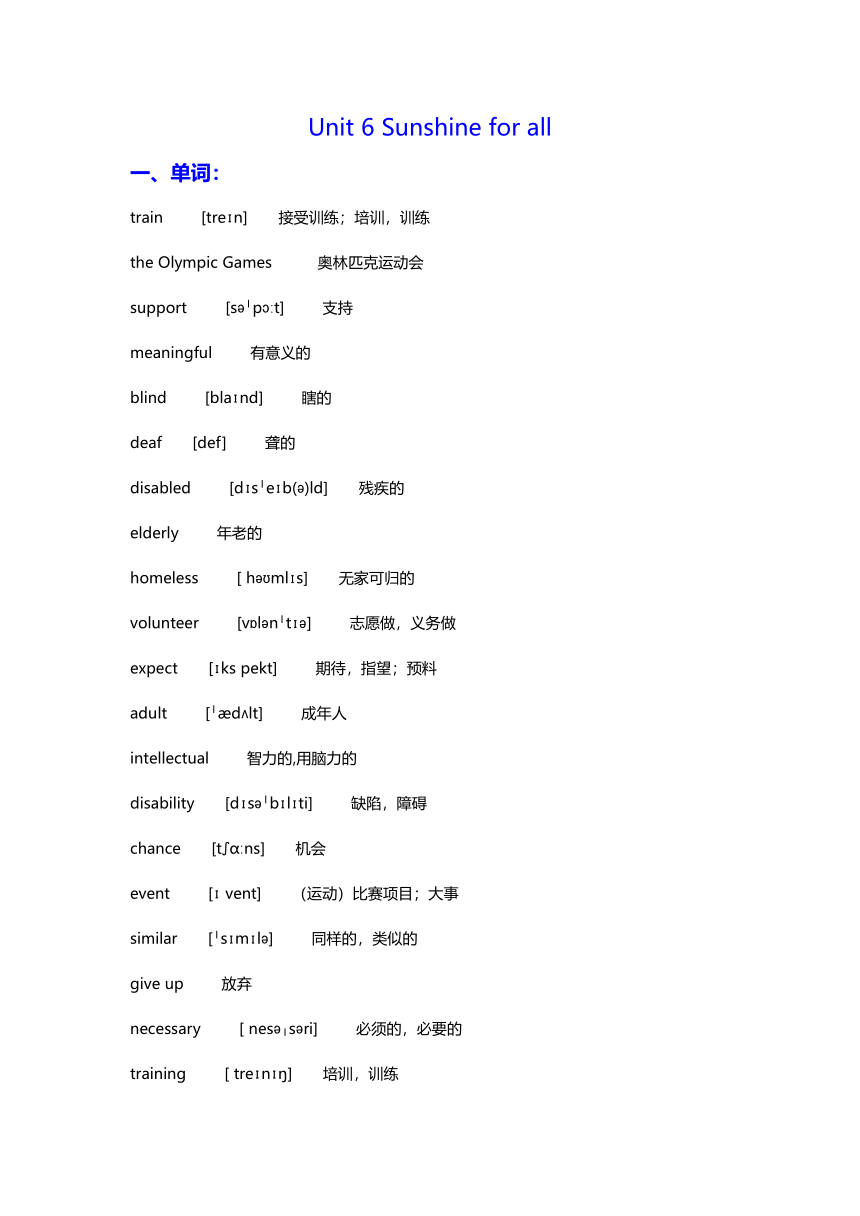 | |
| 格式 | docx | ||
| 文件大小 | 28.7KB | ||
| 资源类型 | 教案 | ||
| 版本资源 | 牛津译林版 | ||
| 科目 | 英语 | ||
| 更新时间 | 2024-03-29 22:11:09 | ||
图片预览

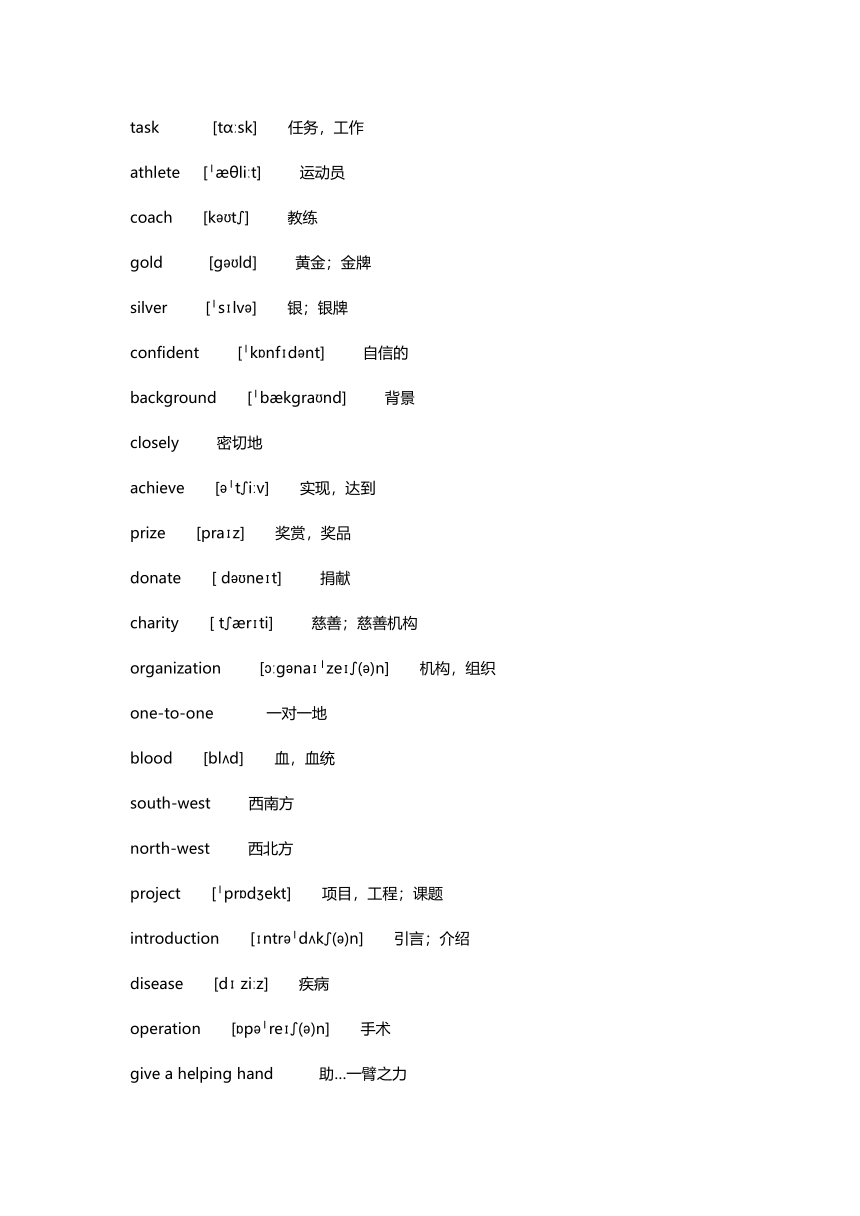
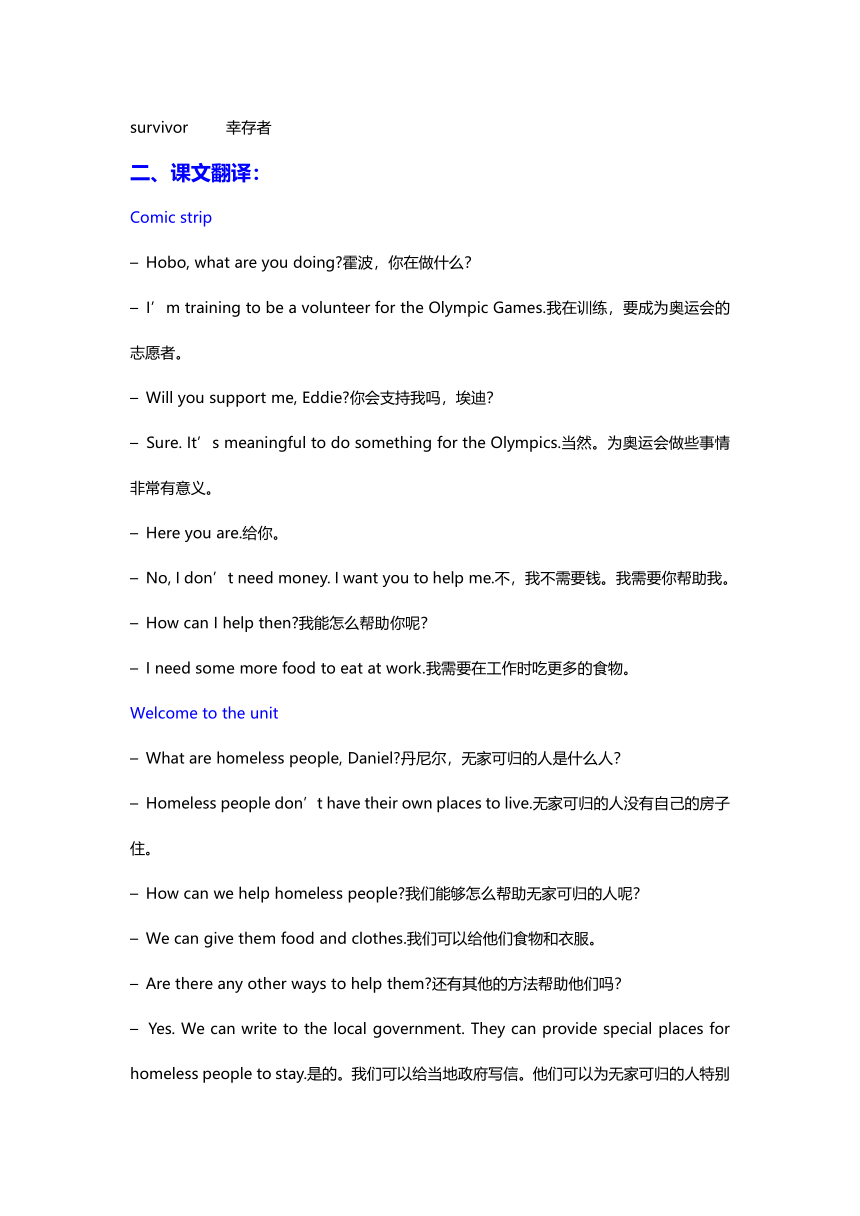
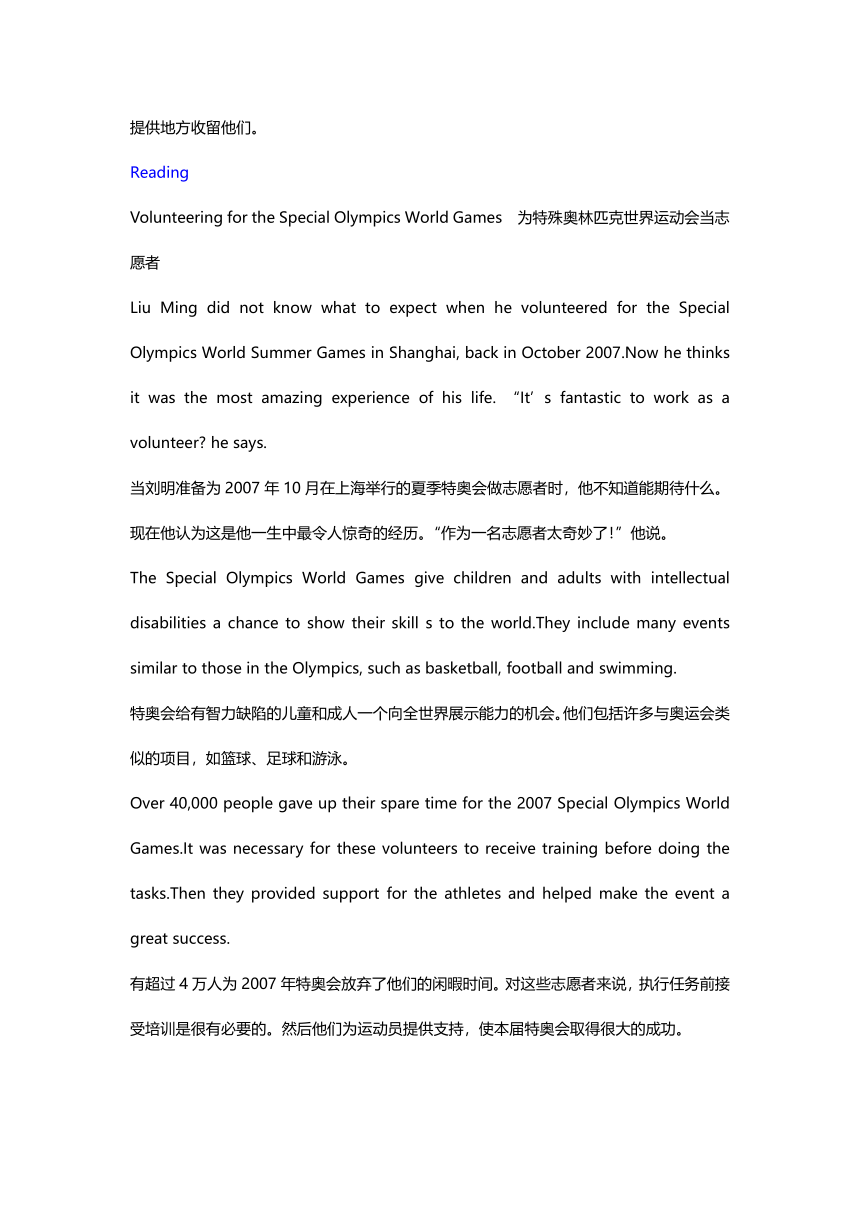
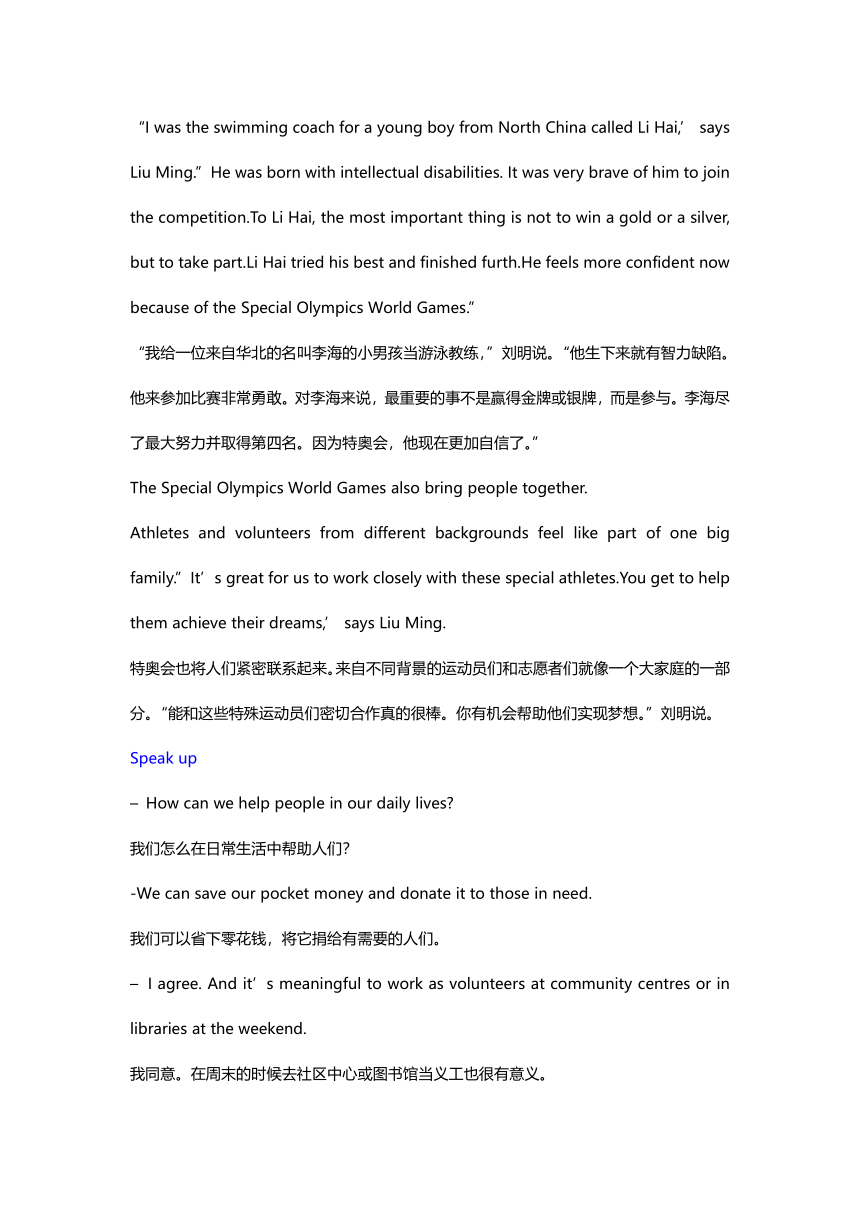
文档简介
Unit 6 Sunshine for all
一、单词:
train [tre n] 接受训练;培训,训练
the Olympic Games 奥林匹克运动会
support [s p t] 支持
meaningful 有意义的
blind [bla nd] 瞎的
deaf [def] 聋的
disabled [d s e b( )ld] 残疾的
elderly 年老的
homeless [ h ml s] 无家可归的
volunteer [v l n t ] 志愿做,义务做
expect [ ks pekt] 期待,指望;预料
adult [ d lt] 成年人
intellectual 智力的,用脑力的
disability [d s b l ti] 缺陷,障碍
chance [t ɑ ns] 机会
event [ vent] (运动)比赛项目;大事
similar [ s m l ] 同样的,类似的
give up 放弃
necessary [ nes s ri] 必须的,必要的
training [ tre n ] 培训,训练
task [tɑ sk] 任务,工作
athlete [ θli t] 运动员
coach [k t ] 教练
gold [ɡ ld] 黄金;金牌
silver [ s lv ] 银;银牌
confident [ k nf d nt] 自信的
background [ b kɡra nd] 背景
closely 密切地
achieve [ t i v] 实现,达到
prize [pra z] 奖赏,奖品
donate [ d ne t] 捐献
charity [ t r ti] 慈善;慈善机构
organization [ ɡ na ze ( )n] 机构,组织
one-to-one 一对一地
blood [bl d] 血,血统
south-west 西南方
north-west 西北方
project [ pr d ekt] 项目,工程;课题
introduction [ ntr d k ( )n] 引言;介绍
disease [d zi z] 疾病
operation [ p re ( )n] 手术
give a helping hand 助…一臂之力
survivor 幸存者
二、课文翻译:
Comic strip
– Hobo, what are you doing 霍波,你在做什么?
– I’m training to be a volunteer for the Olympic Games.我在训练,要成为奥运会的志愿者。
– Will you support me, Eddie 你会支持我吗,埃迪?
– Sure. It’s meaningful to do something for the Olympics.当然。为奥运会做些事情非常有意义。
– Here you are.给你。
– No, I don’t need money. I want you to help me.不,我不需要钱。我需要你帮助我。
– How can I help then 我能怎么帮助你呢?
– I need some more food to eat at work.我需要在工作时吃更多的食物。
Welcome to the unit
– What are homeless people, Daniel 丹尼尔,无家可归的人是什么人?
– Homeless people don’t have their own places to live.无家可归的人没有自己的房子住。
– How can we help homeless people 我们能够怎么帮助无家可归的人呢?
– We can give them food and clothes.我们可以给他们食物和衣服。
– Are there any other ways to help them 还有其他的方法帮助他们吗?
– Yes. We can write to the local government. They can provide special places for homeless people to stay.是的。我们可以给当地政府写信。他们可以为无家可归的人特别提供地方收留他们。
Reading
Volunteering for the Special Olympics World Games 为特殊奥林匹克世界运动会当志愿者
Liu Ming did not know what to expect when he volunteered for the Special Olympics World Summer Games in Shanghai, back in October 2007.Now he thinks it was the most amazing experience of his life. “It’s fantastic to work as a volunteer he says.
当刘明准备为2007年10月在上海举行的夏季特奥会做志愿者时,他不知道能期待什么。现在他认为这是他一生中最令人惊奇的经历。“作为一名志愿者太奇妙了!”他说。
The Special Olympics World Games give children and adults with intellectual disabilities a chance to show their skill s to the world.They include many events similar to those in the Olympics, such as basketball, football and swimming.
特奥会给有智力缺陷的儿童和成人一个向全世界展示能力的机会。他们包括许多与奥运会类似的项目,如篮球、足球和游泳。
Over 40,000 people gave up their spare time for the 2007 Special Olympics World Games.It was necessary for these volunteers to receive training before doing the tasks.Then they provided support for the athletes and helped make the event a great success.
有超过4万人为2007年特奥会放弃了他们的闲暇时间。对这些志愿者来说,执行任务前接受培训是很有必要的。然后他们为运动员提供支持,使本届特奥会取得很大的成功。
“I was the swimming coach for a young boy from North China called Li Hai,’ says Liu Ming.”He was born with intellectual disabilities. It was very brave of him to join the competition.To Li Hai, the most important thing is not to win a gold or a silver, but to take part.Li Hai tried his best and finished furth.He feels more confident now because of the Special Olympics World Games.”
“我给一位来自华北的名叫李海的小男孩当游泳教练,”刘明说。“他生下来就有智力缺陷。他来参加比赛非常勇敢。对李海来说,最重要的事不是赢得金牌或银牌,而是参与。李海尽了最大努力并取得第四名。因为特奥会,他现在更加自信了。”
The Special Olympics World Games also bring people together.
Athletes and volunteers from different backgrounds feel like part of one big family.”It’s great for us to work closely with these special athletes.You get to help them achieve their dreams,’ says Liu Ming.
特奥会也将人们紧密联系起来。来自不同背景的运动员们和志愿者们就像一个大家庭的一部分。“能和这些特殊运动员们密切合作真的很棒。你有机会帮助他们实现梦想。”刘明说。
Speak up
– How can we help people in our daily lives
我们怎么在日常生活中帮助人们?
-We can save our pocket money and donate it to those in need.
我们可以省下零花钱,将它捐给有需要的人们。
– I agree. And it’s meaningful to work as volunteers at community centres or in libraries at the weekend.
我同意。在周末的时候去社区中心或图书馆当义工也很有意义。
– We can also give food to homeless people.
我们也可以把食物给无家可归的人吃。
– Yes. And it’s good to give our seats on the bus to the elderly.
是的。在公交车上给老年人让座也是很好的行为。
Task
Dear all,大家好:
A Grade 9 student at No. 2 Middle School needs our help!第二中学的一位九年级的同学需要我们的帮助!
The student’s name is Xiao Wei.He has been ill in hospital since last month. The doctor says that he has a serious blood disease.An operation may save him, but it will cost over 300,000 yuan.
这位同学的名字叫小伟。他从上个月起就生病住院。医生说他患了一种严重的血液病。做手术也许能挽救他的生命,但是花费超过30万元。
Xiao Wei’s parents are both farmers. They do not have enough money for such an operation.However, it is important for Xiao Wei to have the operation as soon as possible. Otherwise, he may lose his life.
小伟的父母都是农民。他们没有足够的钱支付手术费。但是,对小伟来说,尽快进行手术是当务之急。否则,他有可能失去生命。
I am writing to ask for your help. Please donate money. Many hands make light work.If all of us can give a helping hand, he may get well again soon.
我写信呼吁大家的帮助。请捐钱给他。众人拾柴火焰高。如果我们所有人都伸出援助之手,他就可能很快康复。
Thanks a lot for your help! 非常感谢大家的帮助!
Peter 彼特
三、重要知识点
【词汇精讲】
1.support
(1)support用作动词,意为“支撑、负担重量”。
例如:
Is the bridge strong enough to support heavy lorries
这个大桥是足够结实支撑这个重的货车吗?
(2)support用作动词,意为“养(家);维持(生活);负担(费用)等”。
例如:
It’s difficult for him to support himself on such a small salary.
对于他用这么低的薪水养家很困难。
Air, food and water are necessary to support life.
空气、食物和水是维持生命的必需品。
They encouraged me, and they supported me with money.
他们不仅鼓励我,而且给予我以金钱上的支持。
(3)support用作动词,还表示“支持,赞成”。
例如:
His family supported him in his decision.
他的家庭支持他的决定。
(4)in support of意为“支持,证明 (作状语)”。
例如:
He spoke in support of the plan.
他发言支持这项计划。
2. train
train在本单元作及物动词,意为“接受训练,培训”。
例如:
She is training to be a nurse.她正在接受护士培训。
We should train the children to develop good habit.我们应该训练孩子们养成好的习惯。
【拓展】
(1)train可以作不及物动词,意为“训练,培训”。
例如:
My friends often help me train.我的朋友经常帮我训练。
Tom is training on the playground.汤姆正在操场上训练。
(2)train还可以作名词,意为“火车”。
例如:
The train leaves at five o’clock.火车 5点发车。
(3)training不可数名词,意为“训练”。
例如:
You need more training.你需要更多的锻炼。
3. expect
(1)expect表示“期待,期望”,通常为及物动词,直接跟宾语,还可接不定式的复合结构。
例如:
We should not expect success overnight.
我们不能期望一夜之间就取得成功。
That's just what we expected.那正是我们所期望的。
He expected her to go with him.他期望她同他一起去。
(2)expect还可表示“预计,预料”等,后接动词时要用不定式,不用动名词。
例如:
I expect a storm.我预计会有场暴风雨来。
I expect that I will be back on Sunday.我预计星期日回来。
I didn’t expect to find you here.我没料到在这里碰到你。
(3)expect后可接 that从句,若从句谓语为否定,注意否定的前移。
例如:
I don’t expect that he has done such a thing.我预料他不会干出这种事来。
4. chance
chance是名词,意为“机会”。
例如:
Is there any chance of the team winning this week 这个队本星期有无获胜的机会?
It’s the chance of a lifetime. You shouldn’t miss it.这是一生中难得的机会,你不应该错过。
【拓展】
(1)chance作名词,还有“偶然性,可能性”的意思。
例如:
I met him by chance.我偶然遇到了他。
(2)chance与 opportunity的辨析:
1)当表示有机会做某事时,这两个词的用法相同,后面可接 to do或 of doing。
例如:
I had the chance/opportunity of visiting Beijing.我曾有机会参观北京。
I had no chance/opportunity to see him.我没有机会见到他。
2)chance后可接从句,而 opportunity则不能。
例如:
There is a chance that he will succeed.他有可能获得成功。
5. give up
give up是动词短语,意为“放弃;停止;戒除”。give up doing something意为“放弃做某事;半途而废”。
例如:
She doesn’t give up easily.她不会轻易放弃。
The doctors had given her up but she made a remarkable recovery.
医生们已放弃了治愈她的希望,而她却恢复得很好。
You ought to give up smoking; I gave it up last year.
你应该戒烟,我去年就戒掉了。
【拓展】
give的相关短语:
give away赠送,分发;give off放出,释放;give in屈服,让步;
give out分发,用完;give back归还
6. confident
confident作形容词,意为“自信的,有把握的”。
常构成短语 be confident of/about或 be confident后接 that从句,表示“对……有把握,对……自信”。
He is confident of getting the first place.
他确信拿第一。
He is quite confident that he will pass the examination.
他很有信心通过考试。
【拓展】
confidence作名词,意为“信心,信赖”,常用短语“have confidence in”意为“对……有信心”。
He lacks confidence in himself.他缺少自信。
We have confidence in the mayor.我们信任这位市长。
7. achieve
(1)achieve作及物动词,意为“完成;实现”。
例如:
You will never achieve anything if you spend your time that way.
你若总是这样消磨时间,就永远不会有所成就。
Everybody should be given the chance to achieve their aims.
要让每个人都有机会实现自己的目标。
No one can achieve anything without effort.
谁也不可能不努力而有所作为。
(2)achieve作及物动词,意为“达到;赢得”。
例如:
The actor achieved fame when he was only nineteen.
那位演员十九岁时就成名了。
She achieved no success.她没有获得成功。
【拓展】
achievement作名词,意为“成就;成绩”。
例如:
The invention of the computer is a great achievement.发明电脑是一大成就。
8. improve
improve是动词,意为“改进;改善;提高”。
例如:
You’d better work out a plan to improve your writing skills.
你最好制定一个精心提高写作能力的计划。
We haven’t discovered how to improve it.
我们还没找到如何改进它的办法。
【注意】
improve的意思是“改进;使更好(make better)”,已包含 better之意,因而不能再与
better连用。
【拓展】
improvement是名词,意为“改善;改进;提高”。
例如:
This essay represents a considerable improvement on your recent work.
这篇论文说明你最近的工作取得了相当大的改进。
句式精讲
1. It’s meaningful to do something for the Olympics.
本句用了“It is/was + adj. + to do sth.”的结构,It is/was + adj. + to do sth.意为“做某事是……的”,to do sth.为句子的真正的主语,而 it为形式主语,形式主语不能用别的词来代替,句中可在形容词后加 for sb.,意为“对于某人来说,做某事是……的”。
例如:
It’s important for us to learn a foreign language.
对我们来说,学习一门外语是相当重要的。
It’s necessary for us to eat more fruit and vegetables.
对我们来说,多吃蔬菜和水果是必要的。
【拓展】
这个句型中的 for sb.有时也可以用 of sb.二者意义有区别:
(1)在 It’s + adj. + for sb. to do sth.中,for sb.意为“对某人来说”,句中的形容词是用来说明 to do sth.的,形式主语只能用 it。
例如:
It’s necessary for the students to do some housework.
对于学生们来说,做些家务是十分必要的。
(2)在 It’s + adj. + of sb. to do sth.中of sb.意为“某人……”,句中形容词可与逻辑主语sb.构成系表结构,即形容词是用来说明或形容 sb.(某人)的。例如:
It’s very kind of you to help us.你能帮助我们真是太好了。
2.They include many events similar to those in the Olympics.
be similar to意为“与……相似”,一般用在相近似的物品和情境的对比上。其中to为介词,其后多接名词或者代词。be similar in…意为“在……方面相似”。
例如:
His problem is similar to yours.他的问题和你的相似。
Our cars are similar only in colour.我们的车只是颜色相似。
【拓展】 same与similar
(1)same意为“相同的,同样的”,其前常用定冠词 the。
例如:
We have lunch at the same table.我们在同一张桌子上吃午饭。
(2)similar意为“相似的,类似的”,并不完全一样。
例如:
Lily is similar to Lucy in many ways.在好多方面莉莉同露西相似。
3. Maybe that’s why this event is so different from other usual games.
different形容词,意为“不同的”。其名词形式为“difference”。
The two answers are different.这两个答案是不同的。
Can you tell me the differences between them 你能告诉我他们的不同之处吗?
be different from意为“与……不同”。其反义词组为 the same as意为“和……一样/相同”
例如:
Saying a thing is very different from doing it.说一件事和做一件事很不相同。
I am in the same school as my younger sister.我和我的妹妹在同一所学校。
4. What are the Special Olympics World Games for
what…for意为“有什么用,为什么”。是不理解对方动机或询问对方目的和用途时的用语,for位于句末,一般用动词不定式或 for的介词短语回答。
例如:
What did you hit him for 你为什么打他?
— What did you do that for 你为什么做那件事
— To finish the work early.为了早完成这项工作。
— I’m going to Paris.我要去巴黎。
— What for (= What are you going to Paris for )去做什么?
【拓展】
why也表示“为什么”,但重在询问原因,一般用 because回答。
例如:
(1)— Why do you like P.E. 你为什么喜欢体育?
— Because it’s interesting.因为它有趣。
(2)— What do you like P.E. for 你为什么喜欢体育?
— To keep healthy.为了保持健康。
5. Do you have any trouble talking to people with intellectual disabilities
have trouble doing sth.意为“做某事有困难”,这时 trouble可以用 difficulty来代替。
例如:
I had no trouble finding his phone number.
我毫不费力就找到了他的电话号码。
Did you have any trouble getting there
你到那里有没有遇到什么困难?
【拓展】
in trouble/get into trouble/get sb. into trouble意为“遇到困难;遇到麻烦”。例如:
He was in trouble with the Customs.他在海关那里有了麻烦。
This will get you into trouble.这件事将给你带来麻烦。
一、单词:
train [tre n] 接受训练;培训,训练
the Olympic Games 奥林匹克运动会
support [s p t] 支持
meaningful 有意义的
blind [bla nd] 瞎的
deaf [def] 聋的
disabled [d s e b( )ld] 残疾的
elderly 年老的
homeless [ h ml s] 无家可归的
volunteer [v l n t ] 志愿做,义务做
expect [ ks pekt] 期待,指望;预料
adult [ d lt] 成年人
intellectual 智力的,用脑力的
disability [d s b l ti] 缺陷,障碍
chance [t ɑ ns] 机会
event [ vent] (运动)比赛项目;大事
similar [ s m l ] 同样的,类似的
give up 放弃
necessary [ nes s ri] 必须的,必要的
training [ tre n ] 培训,训练
task [tɑ sk] 任务,工作
athlete [ θli t] 运动员
coach [k t ] 教练
gold [ɡ ld] 黄金;金牌
silver [ s lv ] 银;银牌
confident [ k nf d nt] 自信的
background [ b kɡra nd] 背景
closely 密切地
achieve [ t i v] 实现,达到
prize [pra z] 奖赏,奖品
donate [ d ne t] 捐献
charity [ t r ti] 慈善;慈善机构
organization [ ɡ na ze ( )n] 机构,组织
one-to-one 一对一地
blood [bl d] 血,血统
south-west 西南方
north-west 西北方
project [ pr d ekt] 项目,工程;课题
introduction [ ntr d k ( )n] 引言;介绍
disease [d zi z] 疾病
operation [ p re ( )n] 手术
give a helping hand 助…一臂之力
survivor 幸存者
二、课文翻译:
Comic strip
– Hobo, what are you doing 霍波,你在做什么?
– I’m training to be a volunteer for the Olympic Games.我在训练,要成为奥运会的志愿者。
– Will you support me, Eddie 你会支持我吗,埃迪?
– Sure. It’s meaningful to do something for the Olympics.当然。为奥运会做些事情非常有意义。
– Here you are.给你。
– No, I don’t need money. I want you to help me.不,我不需要钱。我需要你帮助我。
– How can I help then 我能怎么帮助你呢?
– I need some more food to eat at work.我需要在工作时吃更多的食物。
Welcome to the unit
– What are homeless people, Daniel 丹尼尔,无家可归的人是什么人?
– Homeless people don’t have their own places to live.无家可归的人没有自己的房子住。
– How can we help homeless people 我们能够怎么帮助无家可归的人呢?
– We can give them food and clothes.我们可以给他们食物和衣服。
– Are there any other ways to help them 还有其他的方法帮助他们吗?
– Yes. We can write to the local government. They can provide special places for homeless people to stay.是的。我们可以给当地政府写信。他们可以为无家可归的人特别提供地方收留他们。
Reading
Volunteering for the Special Olympics World Games 为特殊奥林匹克世界运动会当志愿者
Liu Ming did not know what to expect when he volunteered for the Special Olympics World Summer Games in Shanghai, back in October 2007.Now he thinks it was the most amazing experience of his life. “It’s fantastic to work as a volunteer he says.
当刘明准备为2007年10月在上海举行的夏季特奥会做志愿者时,他不知道能期待什么。现在他认为这是他一生中最令人惊奇的经历。“作为一名志愿者太奇妙了!”他说。
The Special Olympics World Games give children and adults with intellectual disabilities a chance to show their skill s to the world.They include many events similar to those in the Olympics, such as basketball, football and swimming.
特奥会给有智力缺陷的儿童和成人一个向全世界展示能力的机会。他们包括许多与奥运会类似的项目,如篮球、足球和游泳。
Over 40,000 people gave up their spare time for the 2007 Special Olympics World Games.It was necessary for these volunteers to receive training before doing the tasks.Then they provided support for the athletes and helped make the event a great success.
有超过4万人为2007年特奥会放弃了他们的闲暇时间。对这些志愿者来说,执行任务前接受培训是很有必要的。然后他们为运动员提供支持,使本届特奥会取得很大的成功。
“I was the swimming coach for a young boy from North China called Li Hai,’ says Liu Ming.”He was born with intellectual disabilities. It was very brave of him to join the competition.To Li Hai, the most important thing is not to win a gold or a silver, but to take part.Li Hai tried his best and finished furth.He feels more confident now because of the Special Olympics World Games.”
“我给一位来自华北的名叫李海的小男孩当游泳教练,”刘明说。“他生下来就有智力缺陷。他来参加比赛非常勇敢。对李海来说,最重要的事不是赢得金牌或银牌,而是参与。李海尽了最大努力并取得第四名。因为特奥会,他现在更加自信了。”
The Special Olympics World Games also bring people together.
Athletes and volunteers from different backgrounds feel like part of one big family.”It’s great for us to work closely with these special athletes.You get to help them achieve their dreams,’ says Liu Ming.
特奥会也将人们紧密联系起来。来自不同背景的运动员们和志愿者们就像一个大家庭的一部分。“能和这些特殊运动员们密切合作真的很棒。你有机会帮助他们实现梦想。”刘明说。
Speak up
– How can we help people in our daily lives
我们怎么在日常生活中帮助人们?
-We can save our pocket money and donate it to those in need.
我们可以省下零花钱,将它捐给有需要的人们。
– I agree. And it’s meaningful to work as volunteers at community centres or in libraries at the weekend.
我同意。在周末的时候去社区中心或图书馆当义工也很有意义。
– We can also give food to homeless people.
我们也可以把食物给无家可归的人吃。
– Yes. And it’s good to give our seats on the bus to the elderly.
是的。在公交车上给老年人让座也是很好的行为。
Task
Dear all,大家好:
A Grade 9 student at No. 2 Middle School needs our help!第二中学的一位九年级的同学需要我们的帮助!
The student’s name is Xiao Wei.He has been ill in hospital since last month. The doctor says that he has a serious blood disease.An operation may save him, but it will cost over 300,000 yuan.
这位同学的名字叫小伟。他从上个月起就生病住院。医生说他患了一种严重的血液病。做手术也许能挽救他的生命,但是花费超过30万元。
Xiao Wei’s parents are both farmers. They do not have enough money for such an operation.However, it is important for Xiao Wei to have the operation as soon as possible. Otherwise, he may lose his life.
小伟的父母都是农民。他们没有足够的钱支付手术费。但是,对小伟来说,尽快进行手术是当务之急。否则,他有可能失去生命。
I am writing to ask for your help. Please donate money. Many hands make light work.If all of us can give a helping hand, he may get well again soon.
我写信呼吁大家的帮助。请捐钱给他。众人拾柴火焰高。如果我们所有人都伸出援助之手,他就可能很快康复。
Thanks a lot for your help! 非常感谢大家的帮助!
Peter 彼特
三、重要知识点
【词汇精讲】
1.support
(1)support用作动词,意为“支撑、负担重量”。
例如:
Is the bridge strong enough to support heavy lorries
这个大桥是足够结实支撑这个重的货车吗?
(2)support用作动词,意为“养(家);维持(生活);负担(费用)等”。
例如:
It’s difficult for him to support himself on such a small salary.
对于他用这么低的薪水养家很困难。
Air, food and water are necessary to support life.
空气、食物和水是维持生命的必需品。
They encouraged me, and they supported me with money.
他们不仅鼓励我,而且给予我以金钱上的支持。
(3)support用作动词,还表示“支持,赞成”。
例如:
His family supported him in his decision.
他的家庭支持他的决定。
(4)in support of意为“支持,证明 (作状语)”。
例如:
He spoke in support of the plan.
他发言支持这项计划。
2. train
train在本单元作及物动词,意为“接受训练,培训”。
例如:
She is training to be a nurse.她正在接受护士培训。
We should train the children to develop good habit.我们应该训练孩子们养成好的习惯。
【拓展】
(1)train可以作不及物动词,意为“训练,培训”。
例如:
My friends often help me train.我的朋友经常帮我训练。
Tom is training on the playground.汤姆正在操场上训练。
(2)train还可以作名词,意为“火车”。
例如:
The train leaves at five o’clock.火车 5点发车。
(3)training不可数名词,意为“训练”。
例如:
You need more training.你需要更多的锻炼。
3. expect
(1)expect表示“期待,期望”,通常为及物动词,直接跟宾语,还可接不定式的复合结构。
例如:
We should not expect success overnight.
我们不能期望一夜之间就取得成功。
That's just what we expected.那正是我们所期望的。
He expected her to go with him.他期望她同他一起去。
(2)expect还可表示“预计,预料”等,后接动词时要用不定式,不用动名词。
例如:
I expect a storm.我预计会有场暴风雨来。
I expect that I will be back on Sunday.我预计星期日回来。
I didn’t expect to find you here.我没料到在这里碰到你。
(3)expect后可接 that从句,若从句谓语为否定,注意否定的前移。
例如:
I don’t expect that he has done such a thing.我预料他不会干出这种事来。
4. chance
chance是名词,意为“机会”。
例如:
Is there any chance of the team winning this week 这个队本星期有无获胜的机会?
It’s the chance of a lifetime. You shouldn’t miss it.这是一生中难得的机会,你不应该错过。
【拓展】
(1)chance作名词,还有“偶然性,可能性”的意思。
例如:
I met him by chance.我偶然遇到了他。
(2)chance与 opportunity的辨析:
1)当表示有机会做某事时,这两个词的用法相同,后面可接 to do或 of doing。
例如:
I had the chance/opportunity of visiting Beijing.我曾有机会参观北京。
I had no chance/opportunity to see him.我没有机会见到他。
2)chance后可接从句,而 opportunity则不能。
例如:
There is a chance that he will succeed.他有可能获得成功。
5. give up
give up是动词短语,意为“放弃;停止;戒除”。give up doing something意为“放弃做某事;半途而废”。
例如:
She doesn’t give up easily.她不会轻易放弃。
The doctors had given her up but she made a remarkable recovery.
医生们已放弃了治愈她的希望,而她却恢复得很好。
You ought to give up smoking; I gave it up last year.
你应该戒烟,我去年就戒掉了。
【拓展】
give的相关短语:
give away赠送,分发;give off放出,释放;give in屈服,让步;
give out分发,用完;give back归还
6. confident
confident作形容词,意为“自信的,有把握的”。
常构成短语 be confident of/about或 be confident后接 that从句,表示“对……有把握,对……自信”。
He is confident of getting the first place.
他确信拿第一。
He is quite confident that he will pass the examination.
他很有信心通过考试。
【拓展】
confidence作名词,意为“信心,信赖”,常用短语“have confidence in”意为“对……有信心”。
He lacks confidence in himself.他缺少自信。
We have confidence in the mayor.我们信任这位市长。
7. achieve
(1)achieve作及物动词,意为“完成;实现”。
例如:
You will never achieve anything if you spend your time that way.
你若总是这样消磨时间,就永远不会有所成就。
Everybody should be given the chance to achieve their aims.
要让每个人都有机会实现自己的目标。
No one can achieve anything without effort.
谁也不可能不努力而有所作为。
(2)achieve作及物动词,意为“达到;赢得”。
例如:
The actor achieved fame when he was only nineteen.
那位演员十九岁时就成名了。
She achieved no success.她没有获得成功。
【拓展】
achievement作名词,意为“成就;成绩”。
例如:
The invention of the computer is a great achievement.发明电脑是一大成就。
8. improve
improve是动词,意为“改进;改善;提高”。
例如:
You’d better work out a plan to improve your writing skills.
你最好制定一个精心提高写作能力的计划。
We haven’t discovered how to improve it.
我们还没找到如何改进它的办法。
【注意】
improve的意思是“改进;使更好(make better)”,已包含 better之意,因而不能再与
better连用。
【拓展】
improvement是名词,意为“改善;改进;提高”。
例如:
This essay represents a considerable improvement on your recent work.
这篇论文说明你最近的工作取得了相当大的改进。
句式精讲
1. It’s meaningful to do something for the Olympics.
本句用了“It is/was + adj. + to do sth.”的结构,It is/was + adj. + to do sth.意为“做某事是……的”,to do sth.为句子的真正的主语,而 it为形式主语,形式主语不能用别的词来代替,句中可在形容词后加 for sb.,意为“对于某人来说,做某事是……的”。
例如:
It’s important for us to learn a foreign language.
对我们来说,学习一门外语是相当重要的。
It’s necessary for us to eat more fruit and vegetables.
对我们来说,多吃蔬菜和水果是必要的。
【拓展】
这个句型中的 for sb.有时也可以用 of sb.二者意义有区别:
(1)在 It’s + adj. + for sb. to do sth.中,for sb.意为“对某人来说”,句中的形容词是用来说明 to do sth.的,形式主语只能用 it。
例如:
It’s necessary for the students to do some housework.
对于学生们来说,做些家务是十分必要的。
(2)在 It’s + adj. + of sb. to do sth.中of sb.意为“某人……”,句中形容词可与逻辑主语sb.构成系表结构,即形容词是用来说明或形容 sb.(某人)的。例如:
It’s very kind of you to help us.你能帮助我们真是太好了。
2.They include many events similar to those in the Olympics.
be similar to意为“与……相似”,一般用在相近似的物品和情境的对比上。其中to为介词,其后多接名词或者代词。be similar in…意为“在……方面相似”。
例如:
His problem is similar to yours.他的问题和你的相似。
Our cars are similar only in colour.我们的车只是颜色相似。
【拓展】 same与similar
(1)same意为“相同的,同样的”,其前常用定冠词 the。
例如:
We have lunch at the same table.我们在同一张桌子上吃午饭。
(2)similar意为“相似的,类似的”,并不完全一样。
例如:
Lily is similar to Lucy in many ways.在好多方面莉莉同露西相似。
3. Maybe that’s why this event is so different from other usual games.
different形容词,意为“不同的”。其名词形式为“difference”。
The two answers are different.这两个答案是不同的。
Can you tell me the differences between them 你能告诉我他们的不同之处吗?
be different from意为“与……不同”。其反义词组为 the same as意为“和……一样/相同”
例如:
Saying a thing is very different from doing it.说一件事和做一件事很不相同。
I am in the same school as my younger sister.我和我的妹妹在同一所学校。
4. What are the Special Olympics World Games for
what…for意为“有什么用,为什么”。是不理解对方动机或询问对方目的和用途时的用语,for位于句末,一般用动词不定式或 for的介词短语回答。
例如:
What did you hit him for 你为什么打他?
— What did you do that for 你为什么做那件事
— To finish the work early.为了早完成这项工作。
— I’m going to Paris.我要去巴黎。
— What for (= What are you going to Paris for )去做什么?
【拓展】
why也表示“为什么”,但重在询问原因,一般用 because回答。
例如:
(1)— Why do you like P.E. 你为什么喜欢体育?
— Because it’s interesting.因为它有趣。
(2)— What do you like P.E. for 你为什么喜欢体育?
— To keep healthy.为了保持健康。
5. Do you have any trouble talking to people with intellectual disabilities
have trouble doing sth.意为“做某事有困难”,这时 trouble可以用 difficulty来代替。
例如:
I had no trouble finding his phone number.
我毫不费力就找到了他的电话号码。
Did you have any trouble getting there
你到那里有没有遇到什么困难?
【拓展】
in trouble/get into trouble/get sb. into trouble意为“遇到困难;遇到麻烦”。例如:
He was in trouble with the Customs.他在海关那里有了麻烦。
This will get you into trouble.这件事将给你带来麻烦。
